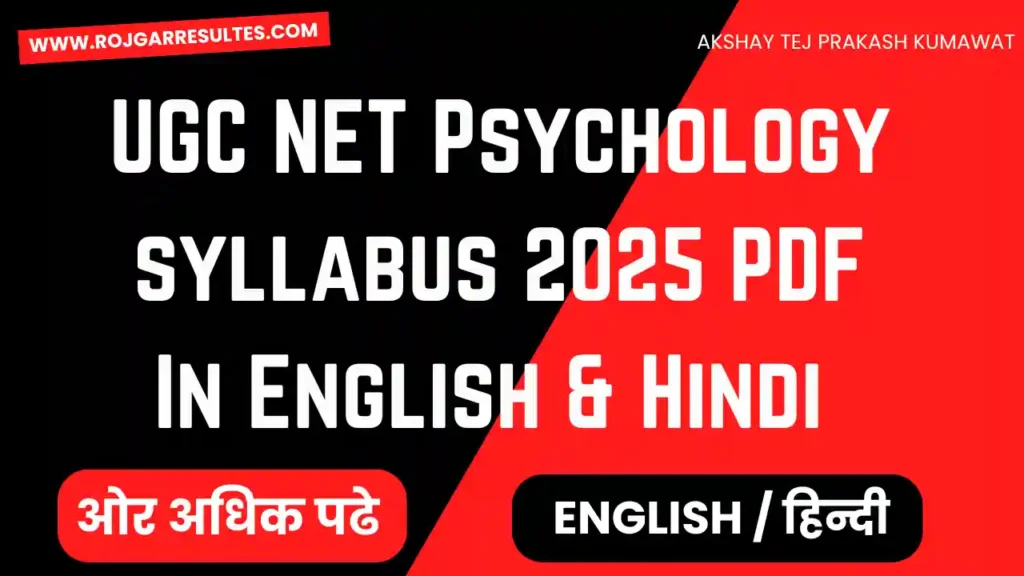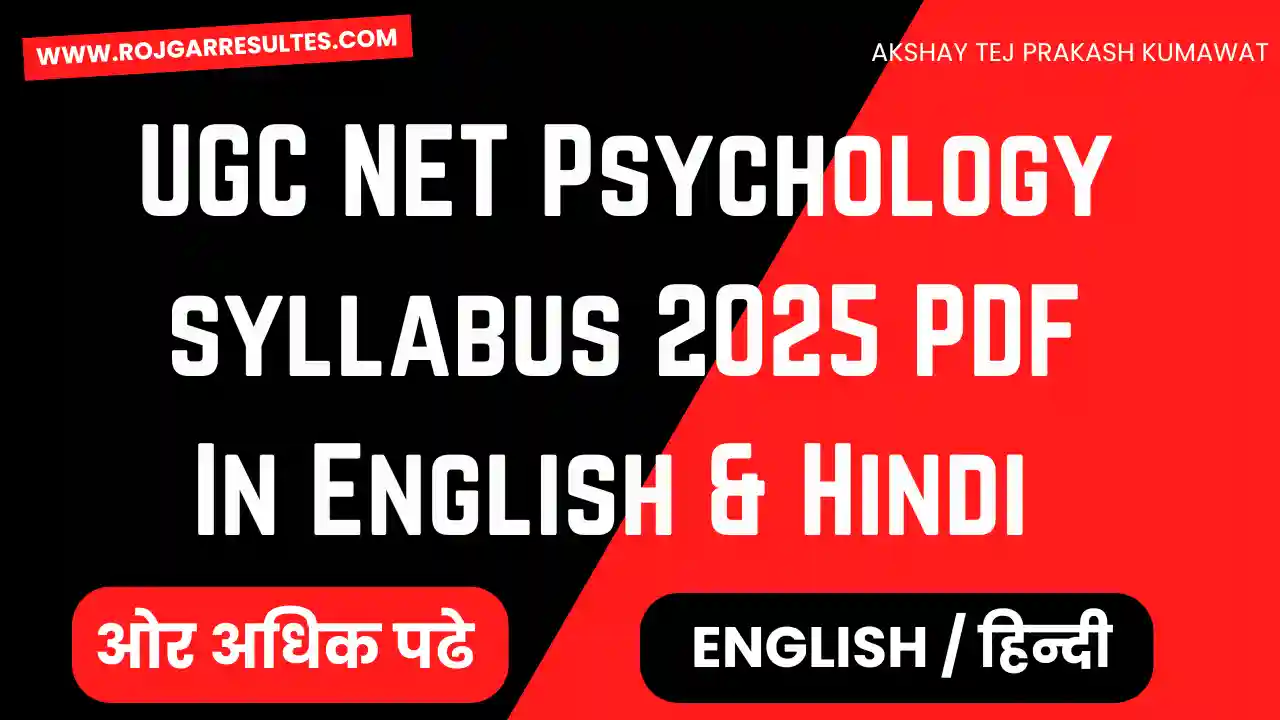Are you preparing for UGC NET Psychology Syllabus 2025? Understanding the complete syllabus is crucial to excel in the exam. The UGC NET in Psychology covers multiple domains ranging from the emergence of psychology to emerging areas in research and application. This blog post provides an in-depth overview of the syllabus to help you plan your preparation strategically.
सभी अभ्यर्थियों को सूचित किया जाता है कि रिजल्ट, सिलेबस, आवेदन लिंक, एडमिट कार्ड व नोटिफिकेशन के सभी लिंक नीचे उपलब्ध हैं।
1. Emergence of Psychology
The UGC NET Psychology Syllabus In English begins with the historical evolution of psychology. Aspirants need to study both Eastern and Western traditions. Eastern systems include teachings from the Bhagavad Gita, Buddhism, Sufism, and Integral Yoga, highlighting the integration of spirituality and self-knowledge in psychological understanding.
In India, academic psychology developed through stages: pre-independence, post-independence, the 1970s focus on social issues, the indigenization phase of the 1980s, and the emergence of Indian psychology in the 2000s. Western psychology traces its roots from Greek heritage, medieval, and modern periods, covering key approaches like Structuralism, Functionalism, Psychoanalytical, Gestalt, Behaviorism, Humanistic-Existential, Cognitive Revolution, and Multiculturalism.
Key focus areas include the crisis in psychology due to strict experimental paradigms, influences of Indian philosophy on modern psychology, and essential knowledge paradigms such as ontology, epistemology, and methodology.
2. Research Methodology and Statistics
A major part of UGC NET Psychology Syllabus PDF In Hindi involves research methodology and statistics. Students should master the meaning, purpose, and dimensions of research, understand variables, hypotheses, sampling methods, and research ethics.
Research paradigms include quantitative, qualitative, and mixed methods, with methods like observation, surveys, experiments, phenomenology, case studies, and ethnography.
Statistics topics include measures of central tendency, dispersion, correlation, regression, factor analysis, ANOVA, MANOVA, ANCOVA, single-subject designs, and more. Power analysis, effect size, and parametric/non-parametric tests are also covered.
3. Psychological Testing
Psychological testing forms a core component of the UGC NET Syllabus Psychology 2025. Topics include types of tests, item writing, test standardization, reliability, validity, and norms.
Aspirants must understand intelligence, creativity, neuropsychological tests, aptitude, personality assessment, interest inventories, and attitude scales like Likert and Semantic Differential. Applications of psychological testing span clinical, organizational, educational, counseling, military, and career guidance settings.
4. Biological Basis of Behavior
The syllabus covers the biological foundations of psychology, including sensory systems, neurons, neurotransmitters, and the central and peripheral nervous systems. Neuroplasticity, hormonal regulation, and genetics are essential topics.
Physiological methods involve invasive techniques (lesion, degeneration, chemical) and non-invasive methods like EEG and brain scanning. Understanding motivation, emotion, and behavior from a biological perspective is critical for UGC NET aspirants.
5. Attention, Perception, Learning, Memory, and Forgetting
This section in UGC NET Psychology Syllabus focuses on cognitive processes. Attention types, perception theories (Gestalt and physiological), perceptual organization, illusions, signal detection theory, and cultural influences on perception are included.
Learning theories cover classical conditioning, instrumental learning, cognitive approaches, observational learning, and neurophysiology of learning. Memory stages include sensory, short-term, working, and long-term memory. Forgetting theories like interference, decay, and motivated forgetting are part of the syllabus.
6. Thinking, Intelligence, and Creativity
Candidates must study theoretical perspectives on thought processes, concept formation, reasoning types, problem-solving strategies, decision-making models, and metacognition.
Intelligence theories include Spearman, Thurstone, Gardner, Sternberg, Goleman, and others. Creativity theories by Guilford, Torrance, and Wallach are crucial, along with the relationship between intelligence and creativity.
7. Personality, Motivation, Emotion, Stress, and Coping
The UGC NET Psychology Syllabus Paper highlights determinants and approaches to personality, including psychoanalytical, social learning, trait, type, cognitive, humanistic, existential, and transpersonal psychology.
Motivation, emotion, stress, and coping cover basic concepts, motivational theories, Zuckerman’s sensation seeking, self-regulation, flow, emotion regulation, stress types, and management strategies like mindfulness, yoga, meditation, biofeedback, and cognitive-behavioral techniques.
8. Social Psychology
Social psychology topics include the nature, scope, and history, traditional theories, social perception, attitudes, group dynamics, social influence, aggression, leadership, intergroup relations, and applied social psychology in health, law, and environmental contexts.
9. Human Development and Interventions
The syllabus addresses developmental processes, including physical, cognitive, emotional, moral, and social development. Theories include psychoanalytical, behavioral, and cognitive perspectives.
Interventions cover psychotherapies such as CBT, MBCT, REBT, positive psychotherapy, family therapy, play therapy, art therapy, and school guidance. Applications in education and counseling techniques are also emphasized.
10. Emerging Areas in Psychology
The UGC NET Psychology Syllabus 2025 explores contemporary issues like gender, poverty, disability, migration, peace psychology, wellbeing, resilience, and psychoneuroimmunology. It also includes psychology’s interface with technology, such as digital learning, cyberbullying, and parental mediation of digital usage.
Conclusion
Mastering the UGC NET Psychology Syllabus 2025 requires a structured study plan covering all ten modules, from the historical emergence of psychology to contemporary issues in wellbeing and technology. A deep understanding of theoretical concepts, research methodology, biological foundations, and applied psychology ensures comprehensive preparation for the exam.
Where can I View the official UGC NET Syllabus Psychology 2025?
official syllabus can be downloaded from the University Grants Commission (UGC) NET website.
What is the UGC NET Syllabus Psychology 2025?
UGC NET Psychology Syllabus 2025 outlines all the topics and areas that candidates need to study to prepare for the National Eligibility Test (NET) in Psychology.
Are research methods included in the UGC NET Psychology Syllabus 2025?
Research methodology and statistics are key components. Candidates need to learn quantitative, qualitative, and mixed research methods, including surveys, experiments, case studies, ANOVA, regression, factor analysis, correlation, and ethical guidelines.

